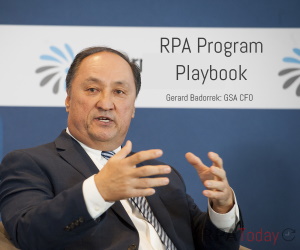
A Community of Practice (CoP) established by the General Services Administration (GSA) to explore opportunities to advance RPA in U.S. government has released its first “playbook” for federal agencies. Version 1.0 of the RPA Program Playbook is not an exhaustive plan for initiating RPA programs, but, rather, it lays out general principles that will increase the chances of success as the federal government looks for ways to become more efficient. The document will be updated regularly, according to the GSA.
“All agencies are charged with pursuing workload elimination, and RPA provides a low-cost tool to make an immediate impact,” said Gerard Badorrek, CFO of the GSA, in the playbook’s introduction. “The opportunity for RPA to transform federal operations is massive. Current RPA programs operating within agencies are achieving roughly five hours of workload elimination per employee. If the government deployed RPA at scale and achieved only 20 hours of workload elimination per employee, the net capacity gained would be worth $3 billion—and that is only scratching the surface.”
To reach those goals, the CoP identifies and details issues around the technology agencies will need and how to manage programs once they are up and running.
Guidance in the playbook can be summarized around six major themes:
- Just get started
- Ensure effective collaboration between the RPA program and the CIO
- Establish aggressive goals and deliver
- Invest in process assessment and improvement capabilities
- Balance the dual priorities of governance and productivity
- Think strategically about technology options

